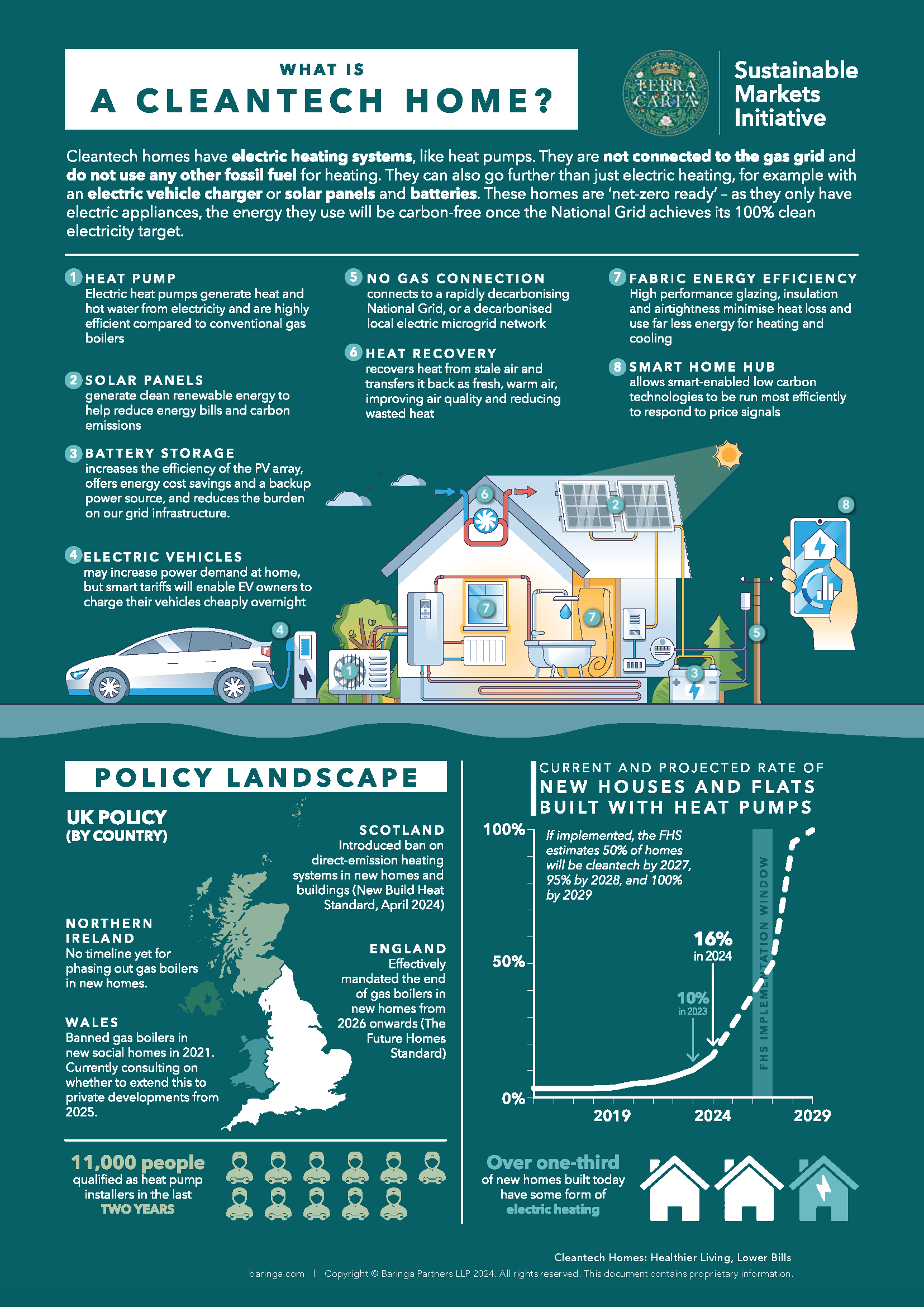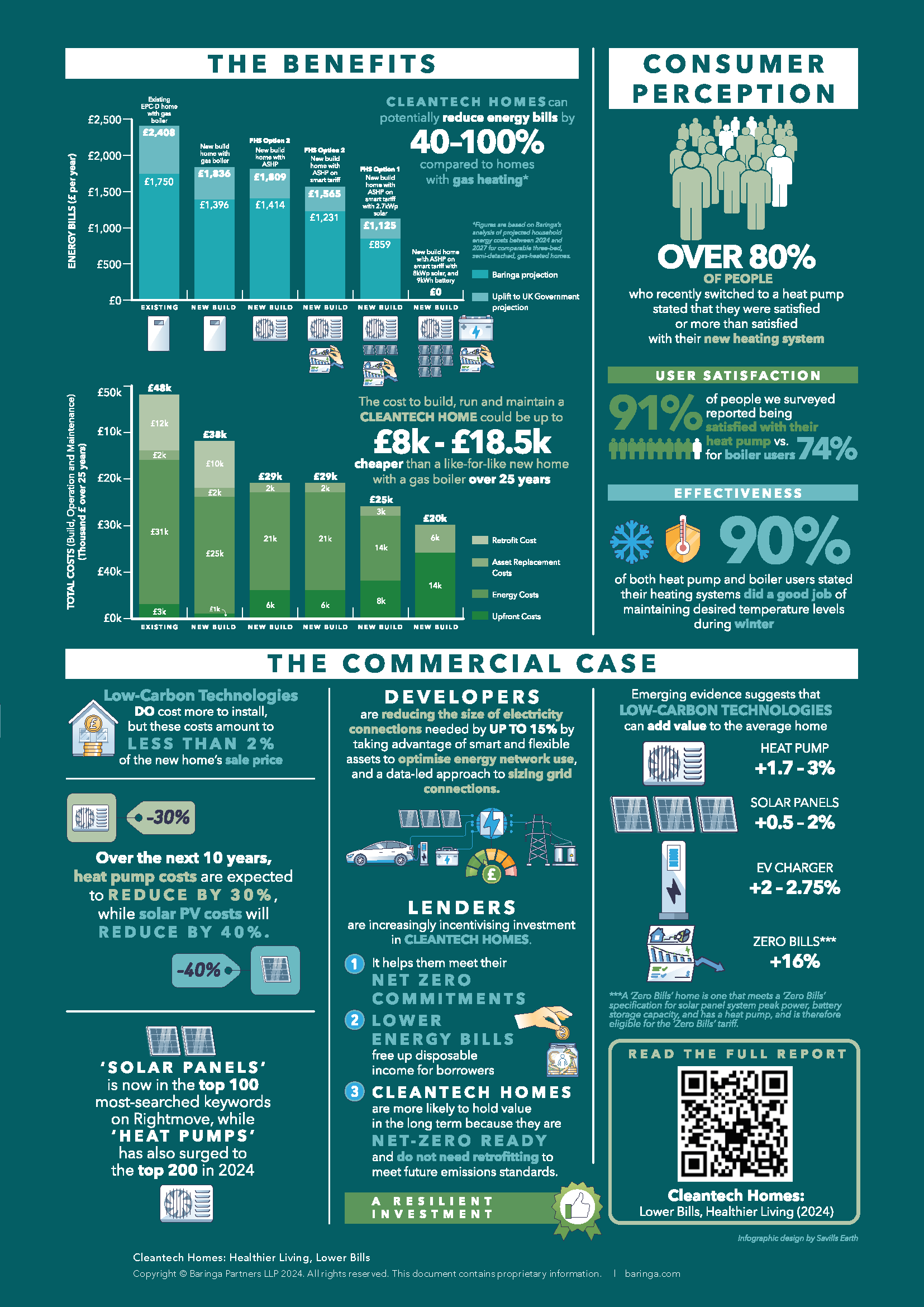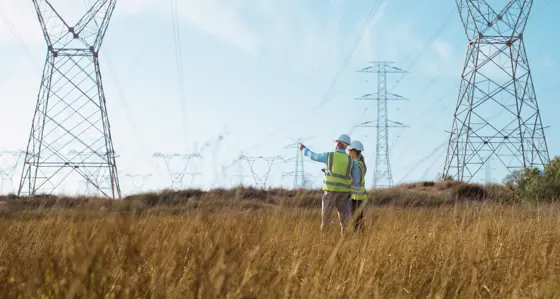
Cleantech Homes: Healthier Living, Lower Bills
4 min read 15 July 2024
What are the benefits of accelerating the decarbonisation of the UK’s new-build residential property sector?
This report has been written by Baringa in the UK on behalf of Octopus Energy and the members of King Charles’s Sustainable Markets Initiative (SMI) Cleantech Homes Lighthouse Project, which involves leading UK businesses committed to the net-zero transition. The study has been written for organisations and policymakers involved across the housebuilding value chain. Its aim is to argue for faster decarbonisation of the UK’s new-build residential property sector. The report highlights the progress made to date and the further industry and policy actions required to accelerate the transition from gas to clean technologies.
The groundbreaking report provides the new Government and developers a blueprint for building more affordable homes in Britain. It shows energy bill savings offset extra build costs, with total cost of ownership savings reaching up to £18,500 over 25 years.
Greg Jackson, founder of Octopus Energy, said: “Homes with heat pumps, solar panels and batteries can make big bills a thing of the past. Sometimes we can eliminate power bills completely.
“With the price of all these technologies falling it’s a cost-effective way to cut power bills while also slashing a big chunk of the UKs climate emissions. It’s time to get on with it, which is why we’re calling for bolder action to accelerate the electrification of home heating.”
Rebecca Teasdale, Baringa expert and report co-author, said: “This study shows that clean technology is a rare example of a true win/win situation. We have the opportunity to reduce people’s bills, help decarbonise the planet, and create new jobs. If ever there was a clear case for investment and focus from the industry, government, and regulators, this is it.”
Read the report to discover why achieving the renewables deployment ambitions outlined in the British Energy Security Strategy will be very challenging without significant coordination across industry and Government to resolve supply chain constraints.
About the research
The energy bills analysis was based on Baringa proprietary analysis using Baringa’s future energy price projections and technical assumptions from Lighthouse Project members.
Baringa also conducted modelling and analysis, as well as secondary research to substantiate the points made in the report.
The study showed some key benefits:


What is a cleantech home?
Cleantech homes have electric heating systems like heat pumps. They are not connected to the gas grid and do not use any other fossil fuel for heating. They can go further than electric heating, for example with an electric vehicle charger or solar panels and batteries. These homes are ‘net-zero ready’ – as they only have electric appliances, the energy they use will be carbon-free once the National Grid achieves its 100% clean electricity target, which is currently by 2035.
About SMI Lighthouse Projects
SMI Lighthouse Projects are created to demonstrate the ways in which stakeholders are making concrete progress to address the pressing societal, economic, environmental, technology, regional, and industry challenges of our time. The SMI taskforce project members include Bellway, Future Homes Hub, the Hill Group, Lloyds Banking Group, Octopus Energy, UK Power Networks, Peabody, Platform Housing Group, PobL, Rightmove, RICS, Savills.
Want to keep up to date or get in touch?
Subscribe to our Energy and Resources Newsletter. Get industry news and trending topics direct to your inbox.
Contact us. Get in touch via our enquiry form with general queries, or contact the authors of this report Rebecca Teasdale.
Related Insights

Synchronisation of the Baltic power system with Continental Europe opens exciting opportunities for batteries
The synchronisation of the Baltic power system with continental Europe is a significant milestone that opens exciting opportunities for batteries.
Read more
Renewables Market Scanning Report
Which are the most attractive markets for investing in renewable assets globally?
Read more
How can investors and developers capitalise on South Korea’s evolving energy market?
South Korea's energy market is transforming in line with the global shift to renewable energy.
Read more
How ‘Equipment-as-a-Service’ models unlock commercial decarbonisation
Read our latest piece, created in collaboration with Tallarna, to explore the components of an ‘Equipment-as-a-Service’ model, how they can be deployed, and how to increase take-up.
Read moreRelated Client Stories

Maximising impact from AI investment for a global energy leader
Discover how a series of experiential learning events resulted in employee confidence in AI skills hitting 85%.
Read more
Maintaining the stability of the New South Wales power system
How do you ensure the future stability of the NSW power system?
Read more
Using AI to manage applications for connecting low-carbon devices
With growing calls for processes to be standardised, Baringa and Energy Networks Association (ENA) came together to develop and launch the first central industry platform to transform the way registrations for low-carbon devices are managed.
Read more
Collaborating globally to future proof Australia’s water resources
How do you effectively manage the ever-evolving supply and demand challenges of water resources?
Read moreIs digital and AI delivering what your business needs?
Digital and AI can solve your toughest challenges and elevate your business performance. But success isn’t always straightforward. Where can you unlock opportunity? And what does it take to set the foundation for lasting success?